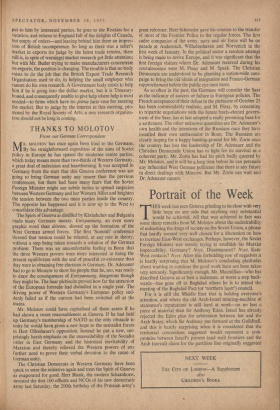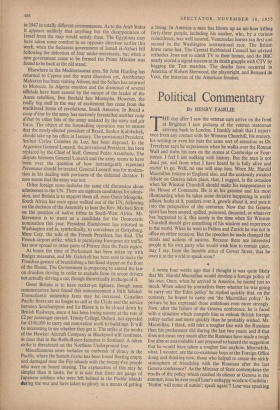Portrait of the Week
THIS week has seen Geneva grinding to its close with very little hope on any side that anything very substantial would be achieVed. All that was achieved in fact was some sharp remarks from M. Molotov about the undesirability of unleashing the dregs of society on the Soviet Union, a phrase that hardly seemed very well chosen for a discussion on how to increase East-West exchanges. Perhaps, however, the Soviet Foreign Minister was merely trying to establish his Marxist impeccability. Germany? Nyet. Disarmament? Nyet. East- West contacts? Nyet. After this forbidding row of negatives it is hardly surprising that M. Molotov's concluding platitudes about wanting to continue the good work have not been taken very seriously. Significantly enough, Mr. Macmillan—who has clscribed Geneva as at best a stalemate, at worst a step back- wards—has gone off to Baghdad where he is to attend the meeting of the Baghdad Pact (or 'northern layer') council.
For it is still the Middle East that is holding everyone's attention, and where the old Arab-Israel mincing-machine of statesmen's reputations is still hard at work—on no less a piece of material than Sir Anthony Eden. Israel has already rejected the Eden plan for arbitration between her and the Arab States, which Sir Anthony put forward at the Guildhall, and this is hardly surprising when it is considered that the territorial concessions suggested would represent a com- promise between Israel's present (and real) frontiers and the Arab (unreal) claim for the partition line originally suggested in 1947 in totally different circumstances. As to the Arab States it appears unlikely that anything but the disappearance of Israel from the map would satisfy them. The Egyptians may have taken some comfort in an opposite direction earlier this week, when the Sudanese government of Ismail el-Azhari fell following the defection of four under-secretaries, but when a new government came to be formed the Prime Minister was found to be back at the old stand.
Elsewhere in the Mediterranean area, Sir John Harding has returned to Cyprus and the worst disorders yet, Archbishop Makarios has been visiting Athens, and the Sultan has returned to Morocco. In Algeria emotion and the dismissal of several officials have been caused by the escape of the leader of the Aures rebellion, Ben Boulaid ben Mustepha. However, the really big stuff in the way of excitement has come from the traditional home of revolutions, South America. In Brazil a coup d'etat by the army has narrowly forestalled another coup d'etat by other bits of the army assisted by the navy and ,air force. The object of the forestalling operation was to ensure that the newly-elected president of Brazil, Senhor Kubitschek, should take up his office in January. The provisional President, Senhor Carlos Coimbra da Luz, has been deposed. In the Argentine General Lonardi, the provisional President, has been replaced by the Chief of Staff, General Pedro Aramburu. The dispute between General Lonardi and the army seems to have been over the question of how intransigently repentant Peronistas should be treated. General Lonardi was for modera- tion in his dealing with partisans of the defeated dictator. It now seems that the army was not.
Other foreign news includes the same old discussion about admissions to the UN. There are eighteen candidates for admis- sion, and Britain is to support them all, even Outer Mongolia. South Africa has once again walked out of the UN, following on the decision of the Assembly to hear the Rev. Michael Scott on the position of native tribes in South-West Africa. Mr. Stevenson is to stand as a candidate for the Democratic nomination this year. President Eisenhower has returned to Washington and is, symbolically, to convalesce at Gettysburg. Mme Coty, the wife of the French President, has died. The French airport strike, which is paralysing European air traffic, has now spread to other parts of France than the Paris region.
At home the time of Parliament has been taken up with Budget measures, and Mr. Gaitskell has been seen to make the Freudian gesture of brandishing a fur-lined slipper on the floor of the House. The Government is proposing to amend the law on drunken driving in order to exclude from its scope drivers not actually driving a car, though theoretically in charge of it.
Great Britain is to have rocket-jet fighters, though some commentators have found this announcement a little belated. Transatlantic steamship fares may be increased, Canadian Pacific liners are no longer to call at the Clyde and the service between Southampton and Le Havre is to be closed down by British Railways, since it has been losing money at the rate of £2 per passenger carried. Trinity College, Oxford,has appealed for £100,000 to carry out restoration work to buildings. It will be interesting to see whether they get it. The strike at the works of the Hawker Aircraft Company at Blackpool still continues, as does that in the Rolls-Royce factories in Scotland. A token strike is threatened on the Northern Underground line.
Miscellaneous news includes an outbreak of piracy in the Pacific, where the launch Joyita has been found floating empty and damaged near the Fiji islands with the twenty-five people who were on board missing. The explanation of this may be simpler than it looks, for it is said that there are gangs of Japanese soldiers who were left behind in the Pacific islands during the war and have taken to piracy as a means of getting a living. In America a man has blown up an air-liner killing forty-three people, including his mother, who, by a curious coincidence, was well insured. Venezuelan horses ran first and second in the Washington international race. The British horse came last. The Central Rabbinical Council has advised orthodox Jews not to admit TV to their homes, and the BBC nearly scored a signal success in its death grapple with CTV by bagging the Test matches. The deaths have occurred in America of Robert Sherwood, the playwright, and Bernard de Voto, the historian of the American frontier.











































































 Previous page
Previous page